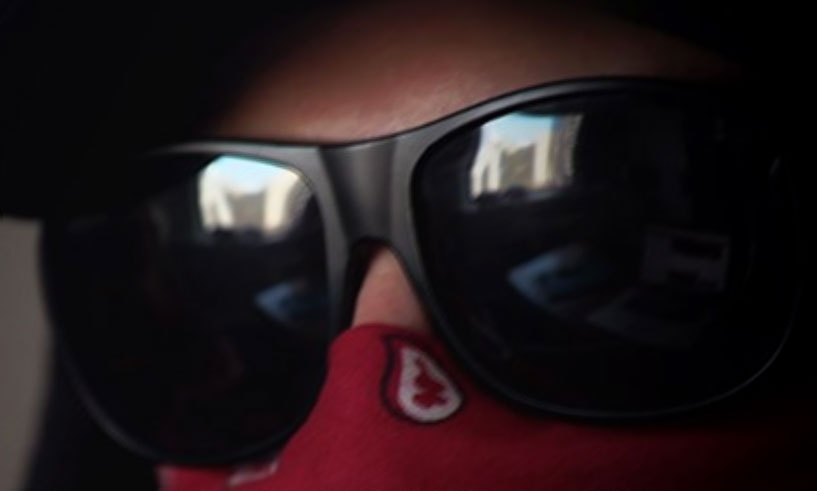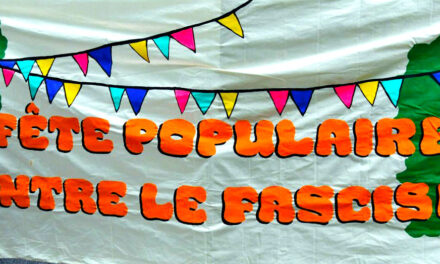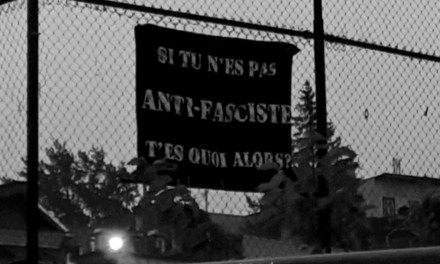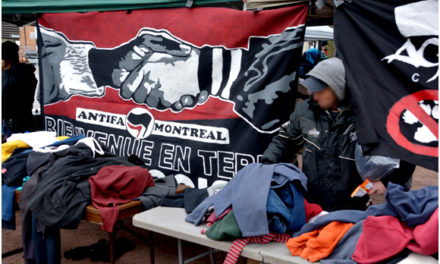Montréal, January 9, 2020 — On January 5, the CBC broadcast a Fifth Estate exposé on the rise of far-right movements in Canada from the perspective of antifascist militants who organize to resist this phenomenon. In an exception to our protocol regarding relations with the mass media, the Montréal Antifasciste collective agreed last summer to participate in this project, in the hope of sharing our ideas and political principles with a public largely outside of our normal sphere of influence.
After viewing the documentary, we offer our mixed (relatively positive) assessment of the exercise, which nonetheless served to confirm and reinforce the principles that generally guide our relations with the mass media.
First, we should say that the documentary allowed us to effectively deliver the key message underlying our antifascist activity: far-right groups constitute not only a problem but a clear and present danger that must be eliminated by any means necessary. The choice of speakers and the quotes used in the documentary adequately framed the subject, presented the issues, and clarified some of our fundamental positions. As far as that goes, we achieved our minimum goal.
That said, and whatever our detractors might think, it’s pretty obvious from the nature of the host’s questions and some of the footage used that there was both an effort being made to pull us onto a minefield and a good deal of concern about presenting an image of impartiality anchored in sacrosanct (and falsely neutral) liberal democratic values.
Unfortunately, the quasi-obsessive focus on grilling us about the (possible) use of violence and our insistence on maintaining our anonymity, our alleged status as “thought police” and “vigilantes,” and the “ironic” nature of our efforts took up an inordinate amount of space in the (twenty-three-minute) documentary, completely obscuring other important elements of antifascist practice that had been discussed during the interviews. We should specify that we were interviewed in-depth twice by the Fifth Estate during the preparation of the documentary, both times for forty-five minutes or more, and the majority of the questions addressed these particular issues. Needless to say, the answers included in the final cut reflect only limited aspects of the answers we provided during these interviews, with entire questions and answers left on the cutting room floor.
Here, we come up against a number of the limitations inherent to the economics of the mass media and the sort of journalism nurtured by this Crown Corporation. To begin with, the journalists’ principal preoccupation seems to be that they “appear” to be neutral or impartial when dealing with a controversial subject, even when the very idea of such neutrality is completely unrealistic; there is always an underlying point of view, whether explicit or implicit. In this case, the reference point is an ideological attachment to liberal democratic “norms and values,” blind obedience to the law and to the authority of the state, a view that all violence is by definition categorically unreasonable, respect for social convention, etc. For journalists, these values are the touchstone for measuring the legitimacy of political action.
The technical constraints related to the broadcasting format, which are determined by economic imperatives, are also a significant limitation. Leaving aside the approach taken by the CBC journalists, it is to all intents and purposes impossible to examine such a complex subject in a nuanced way in twenty minutes.
We hoped to “reach a broader audience” and communicate a certain number of political ideas that would contribute to breaking through our opponents’ relentless portrayal of us as mindless, bloodthirsty thugs. Unfortunately, even if it was entirely foreseeable, we nonetheless must admit that we failed to achieve this.
We explained the origin of Montréal Antifasciste and the circumstances behind its creation. We talked about the historic origins of the antifascist movement and the direct connection between the contemporary movement and its precursors. We provided a detailed explanation of our “no platform” approach and were at pains to clarify why freedom of expression is not synonymous with the freedom to engage in hate speech. We outlined the different approaches and tactics that we use in different ways under different circumstances to achieve our objectives. We specifically stated that, without categorically rejecting the recourse to violence as a means, physical confrontation only constitutes an infinitesimal part of the numerous activities antifascists engage in, and we did so at length and in detail. We insisted on the centrality of popular education and community building. We were quite clear that we are normal people with normal daily lives, that each have our own reasons for participating in this movement, and that what unites us is empathy, the necessity for solidarity, and a desire to create a more just world for everyone. Finally, we stressed that the antifascist struggle is inseparable from the struggles against capitalism, racism, patriarchy, and colonialism.
All of that ended up on the cutting room floor.
Even if, overall, we feel that we achieved our minimum goal, the balance sheet on this exercise only makes it once again apparent that we need to produce our own content, on our own terms, and at our own pace. We need to encourage sympathetic documentarians and video activists unencumbered by the vapid desire for objectivity to seriously embrace the antiracist and antifascist movement. Even better, we need to develop the means to produce our own popular education tools, books, brochures, podcasts, videos, and documentaries. How to deliver our message intact to a broad audience still remains an issue, particular as social media now limits our ability to disseminate material with radical political content. That is why we also need to find a way to reach a much larger public without depending on mass media, with its predetermined conservative mindset.
To conclude, here’s a short list of some independently produced exposés and documentaries that provide an honest view of the contemporary antifascist movement and its practices:





